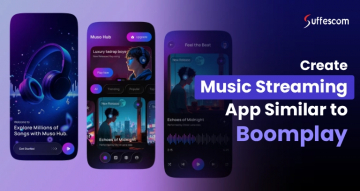AI Therapeutic Assistant Development To Build Smarter Therapy Workflows

AI companions have become humans' best friends since they show how real-life interactions occur. The up-to-date technologies, including NLP and EI algorithms, enable meaningful discussions. Today, the attributes of these AI companions vary from creating mere chatbots to full-fledged AI agents that offer mental support, give mental health guidance, and integrate therapeutic therapies. A therapeutic assistant and AI companion effectively assists with several psychological and behavioral tasks, including CBT activities, tracking of mood, and meditation guidance.
Working Model of AI Therapeutic Assistant App
The AI copilot mimics the human conversation to deliver mental health counseling and therapy. NLP assists in understanding user inputs, identifies the emotional context, and, based on that, fulfills the therapeutic needs. The AI algorithms assist in creating appropriate and empathy-filled responses meant to assist users in managing stress, anxiety, or other mental illnesses.
- Takes text or voice inputs and processes information
- Employing NLP models to comprehend emotional signals
- User mood and emotional state analysis
- Stores conversational context and user history for personalized conversation.
- Generates relevant responses via generative AI models.
- Safeguards user data confidentiality and complies with regulatory bodies.
- Upgrade future interactions with gathered user feedback.
AI Therapeutic Assistant Development: Objectives & Intentions Behind
Developing an AI-assisted therapist assistant allows businesses to increase their ambit of work with the psychological counseling of millions of individuals. Expertise in AI therapy chatbot development is crucial for successfully delivering these solutions, which bridge the gap with 24/7 support, interventions tailored to specific needs, and being anonymous, among various advantages.
AI Copilot for therapists is not only beneficial for people in terms of providing emotional support, but also opens a door to developing resilience and mindfulness. Businesses are shifting towards implementing ultra-contemporary technologies that will eventually position them as the most trusted digital companions because they are connected with sophisticated healthcare systems, data-driven health monitoring, and providing engaging and supportive conversations.
Best-In-Class AI Therapeutic Assistant Development Services
AI Companion and Therapeutic Assistant Development Services We offer
Create an AI-powered therapist assistant that leverages emerging technologies, exuding responsiveness and user-friendliness. Take a glimpse at the following services that make the entire development journey seamless.
1. Consultation
Receive the appropriate guidance on AI-powered chatbots and virtual assistants across the industry domains, helping clients to gain clear knowledge about the development stages, timeline, features, cost, etc.
2. Customization
Build an AI therapist app with customized features, design, and functionalities that meet the project requirements. All necessary steps are taken, following business guidelines and needs, to provide tailored experiences.
3. Continuous Support
The AI therapist assistant is fully integrated with the existing platform, without compromising data integrity or reducing manual effort, thereby creating a streamlined workflow.
4. Integration
The developed virtual assistant is tested for errors and is further maintained by relevant security patches, ensuring that the app functions smoothly while addressing user feedback.
Salient Features of AI Copilot for Therapists
Tap into the extensive range of features that aim to deliver personal assistance, advanced therapy sessions, meditation techniques, mood tracking, etc., that help win user trust and benefit businesses excessively. Deliver accelerated patient care services with the matchless mental health app solutions that smooth operations and drive massive revenue.
1. Conversational Abilities
Uses NLP to fully analyze the user input (slang, emotional connotations) to reply in a contextually correct and meaningful manner. Such conversational skills are responsible for human-like and friendly responses, building a sense of comfort.
2. Multimodal Interaction
Possess various modes of interaction aside from text, such as voice chat, video chats, and even facial recognition, enhancing communication and creating engaging experience. Multimodal inputs allow the assistant to better gauge emotional conditions, increasing realism of assistance.
3. Crisis Detection
Identifies crisis situations, such as suicidal tendencies and self-harm risk. With monitoring of user feedback for warning signs or dangerous behavior, the system triggers alerts, delivers emergency resources, and escalates human involvement.
4. 24/7 Availability
AI therapeutic assistant is available at any location and time in case of late-night anxiety or sudden stress episodes. The availability at all times removes the barriers related to fixing appointments, location factors, and stigmatization in seeking help.
5. Personalization
AI copilot learns from single interactions and fine-tunes the strategy based on the user's mood tendencies, preferences, and feedback. The assistant learns to respond more promptly to the user's needs, providing increasingly relevant and personal help.
6. Emotion and Sentiment Analysis
Assists in determining the emotional state of the user through facial expressions, voice or text. The emotions whether anxious, sadness are immediately identified by the AI therapeutic assistants and responses are tailored, enhancing engagement.
7. Therapeutic Framework Integration
With this feature, various psychotherapeutic models, such as CBT and DBT, are integrated, enabling AI assistants to help users manage stress. The therapeutic drills, coping skills, and self-care tools allow for the mental health betterment.
8. Data Security
With this attribute, the user’s data is secured and authenticated with robust encryption protocols and top-notch authentication methods that help maintain user confidentiality.
AI Copilot for Therapists: Step-By-Step Development Process
Leverage our Generative AI development services combined with technical expertise that will upscale your business towards remarkable business growth. As a team, we follow the best possible steps involved in creating the feature-rich AI-powered therapist assistant app.
1. Requirement Analysis
AI therapeutic assistant development begins with a thorough requirements analysis that specifies the target population, understand their needs to meet the project objectives. During this phase, all stakeholders work together to determine the most effective therapeutic models. Moreover, applying the ethics of care approach to AI regulation can offer a more comprehensive regulatory and ethical framework, compliance with regulations like HIPAA & GDPR are performed that help deal with sensitive mental health information.
2. UI/UX Design
Frontend frameworks are utilized by developers to create cross-platform interfaces. The UI contains modules for real-time chat, emotional check-ins, mood graphs, journaling, and therapy exercises. The assistant incorporates accessibility features. The UX is tested with target users and mental health professionals to ensure support of therapeutic objectives while being friendly, non-judgmental, and easy to use.
3. NLP System Development
The core of the assistant is NLP, which enables it to understand user input and generate appropriate therapeutic outputs. Various language learning models are fine-tuned using domain-specific corpora. The assistant also employs memory modules rule-based or vector embeddings to maintain context retention across sessions so that the assistant can have longitudinal therapeutic conversations.
4. Backend Infrastructure
The backend of the AI therapist assistant is built with a focus on scalability, security, and performance. The user data and server-side logic on the server are stored using end-to-end encryption methods. Developers practice data minimization by storing only the required, anonymized interaction data for model retraining and performance monitoring. However, microservices architecture is employed to modularize the components for crisis detection and better analytics.
5. Continuous Testing
Extensive evaluation guarantees that the assistant is therapeutic, technically competent, and ethical. It involves unit tests, integration A/B testing, and penetration tests that are performed to assess efficacy and enhance performance.
6. Deployment & Maintenance
The final stage encompasses safe deployment, real-time monitoring, and post-deployment governance of the AI copilot assistant. The key metrics, like uptime, response time, emotion classification, and user interaction, are tracked effectively. Also, the technical glitches and the regular updates are offered post-launch.
Popular AI Companion & Therapeutic Assistants Fostering Innovation
Developing an AI therapy app with extended functionalities that focuses on delivering conversational talks and interactions. Harness our AI copilot solutions, which provide helpful suggestions to automate interactions and manage inquiries.
1. Woebot
Woebot makes mental health support services accessible to all with its advanced chat-based AI wellness tools. With proven therapeutic frameworks like CBT, the users get access to the ultra-modern health resources and treatments.
2. Abby
Offers around-the-clock services and helps users navigate through life challenges seamlessly. Whether it's office stress or relationship struggle, this AI therapist companion offers an empathetic space and guidance whenever required the most.
3. Wysa
This AI companion cum virtual therapist comes with self help tools, mood tracking elements, guided meditation that provides non-stop emotional support helping users cope with mental health issues.
4. Tess
Tess is a mental health AI created for scalable mental wellness support, particularly utilized by healthcare providers, employers, and health plans. Tess utilizes natural language processing to provide personalized emotional care through SMS or chat-based interfaces.
5. Youper
Youper is an emotional health AI assistant that integrates CBT, acceptance and commitment therapy (ACT), and mindfulness-based techniques. Youper assists users to track their emotions, become aware of thought patterns, and learn emotion regulation skills.
6. Ginger
Ginger is a full-featured mental health system with AI-facilitated chat support in addition to access to human coaches and licensed therapists. The AI assistant offers instant emotional support, mood monitoring, and self-care suggestions.
Top-Tier AI Patient Care Companion App Solutions
AI Therapeutic Assistant Development: Enhancing Mental Health & Streamlined Processes
Build an AI therapist app that provides perks to both individuals and businesses as illustrated under;
a. For Users
1. Confidentiality
The AI-powered copilot acts as a private space where individuals seek assistance without thinking about the judgment, helping them to seek help without disclosing their personal identity and details.
2. Affordability
AI therapy apps are cost-effective as compared to the conventional therapy sessions, which helps take the mental health situation seriously by people globally.
3. Personalized Support
The use of data analytics helps the AI therapist assistants to tailor the responses according to every individual's needs, increasing effectiveness and relevance.
4. Stigma Reduction
The AI Copilot for physical therapy helps reduce the stigma associated with seeking mental health care, encouraging more individuals to seek help.
5. Emotional Support
AI Copilot for therapists engages in conversations that alleviate feelings of loneliness and provide emotional comfort, especially for individuals in isolated situations.
6. Therapeutic Sessions
The AI copilot systems are integrated with evidence-based methods that offer users structured approaches to manage mental health challenges.
7. 24/7 Availability
AI companions and therapeutic assistants provide non-stop assistance, available every day, so that help is accessible to users at any time without requiring them to wait for appointments.
b. For Businesses
1. Scalability
AI therapy apps serve a large number of users simultaneously, making them ideal for meeting the growing global demand for mental health care.
2. Universal Reach
AI copilot systems transcend geographical boundaries, enabling businesses to provide mental health care to users worldwide, including those in underserved areas.
3. Actionable Insights
Businesses offer customised treatment plans, predict medical health conditions beforehand by fetching valuable insights that eventually enhance patient outcomes.
4. Operational Efficiency
Tasks like handling appointment scheduling and medication reminders are performed without any human intervention and without facing any delay, improving patient engagement.
5. Improved User Engagement
The interactive nature of AI Copilot for physical therapy keeps users engaged, encouraging regular use and fostering a sense of support and community.
6. Revenue Generation
Create an AI-powered therapist assistant that allows businesses to generate money via subscription models, access to premium features and personalized services.
Technology Stacks used in AI Copilot for Therapists
| Aspects | Tech Stacks | Description |
| NLP | GenAI GPT-4o, BERT, | Generates human-like text responses |
| Sentiment & Emotion Analysis | GoEmotions dataset, LSTM, CNN Models | Detects emotional states and sentiment in user inputs |
| Speech Processing | Whisper, Google Speech-to-Text | Analyzes tone, pitch, and converts speech to text |
| Computer Vision | TensorFlow, PyTorch | For facial expression recognition and gesture detection |
| Dialogue Management | Microsoft Bot Framework, Rasa | Controls conversation flow and decision making |
| Frontend Development | React, Flutter, SwiftUI, React Native | Building cross-platform interfaces |
| Backend Infrastructure | AWS HealthLake, Microsoft Azure | Offers scalability, security, and HIPAA compliance for data storage. |
| Data Storage | PostgreSQL, MongoDB | Stores user data securely |
| CI/CD | Docker, Kubernetes | Allows smooth updates and scalable deployment |
| Monitoring & Logging | Prometheus, Grafana | Monitor system performance |
AI Therapeutic Assistant Development Cost: Comprehending The Factors
Building an AI therapeutic assistant costs anything between $10,000 and $25,000 and can increase even more depending on complexity, functionality, and size. The parameters affecting the cost are explained as under;
- Licensing or creating sophisticated NLP models (such as GPT-4 or custom fine-tuned models) is costly, including computation resources for training and inference.
- Development or acquisition of emotion recognition and sentiment analysis software also contributes to the expense.
- Investment in secure architecture, encryption, consent management, and legal advice is needed to ensure HIPAA, GDPR, and other privacy legislation compliance.
- The geolocation of the development team (AI researchers, software engineers, UX/UI designers, data scientists, and DevOps )and the integration of the technology stacks
- Utilization of cloud services (AWS, Azure) and third-party APIs has operational expenses.
- The use of HQ visual elements to make an intuitive user interface and experience. Creating responsive, accessible interfaces across multiple platforms requires dedicated development and design effort.
Why Choose Suffescom As An AI Therapeutic Assistant Development Partner?
Collaborate with a reliable AI development company that will help you turn your dream goals into reality. Peek into the extensive set of services that are meant for small, medium and complex projects.
1. AI/ML Expertise
We have an experienced team of AI and ML engineers who build sophisticated AI copilots for enterprises across various industries. Experience guaranteed AI solutions tailored to your business needs.
2. Custom Solutions
Suffescom specializes in developing tailored AI copilots that perfectly fit your individual workflows, user identities, and business goals.
3. Competitive Pricing
Our team collaborates closely with the clients to establish well-defined business outcomes and quantifiable KPIs, ensuring maximum ROI and lower costs.
4. Proven Track Record
We have 13+ years of experience in the IT field and have a successful portfolio of developing HQ AI apps, helping gain the client's trust worldwide.
5. Seamless Integration
Our team perfectly integrates the AI copilot system with your current software, tools, and platforms to ensure smooth workflows with maximized efficiency.
6. Performance Optimization
Our team designs AI copilots that handle large user bases and focus on scalable architecture, ensuring smooth performance.
FAQs
1. What is an AI companion and therapeutic assistant, and how does it support mental health?
AI copilots for therapy are driven by AI that offers engaging conversations and emotional support through evidence-based therapeutic techniques. The 24/7 availability, private space, mood tracking attributes, relaxation exercises and enhancing mental health.
2. How is data security maintained in the AI therapist assistant?
The implementation of data masking and pseudonymization, end-to-end encryption, real-time threat detection, secure data storage, and regular security testing helps secure the app/platform.
3. How long does it take to build an AI copilot for therapy?
The AI therapeutic assistant development cost ranges between $10000-$35000, based on the project requirements.
4. How much does it cost to build AI companion and therapeutic assistant apps?
Building an AI therapist app takes around 4-6 weeks, depending on the level of complexity and integrations.
5. How do AI companions assist in crisis situations?
Offering guided meditations, coping strategies, enhanced emotional support, and help effectively handle emergency situations and offer appropriate mental health assistance.
6. Can the AI copilot for therapy be integrated with the existing platforms?
Yes! Our team of professionals will help you integrate the AI companion cum therapeutic assistance in the already existing platform.







